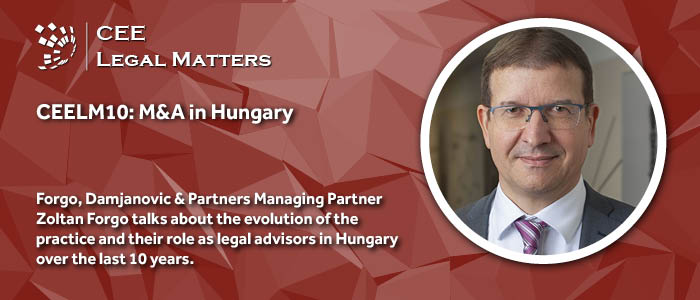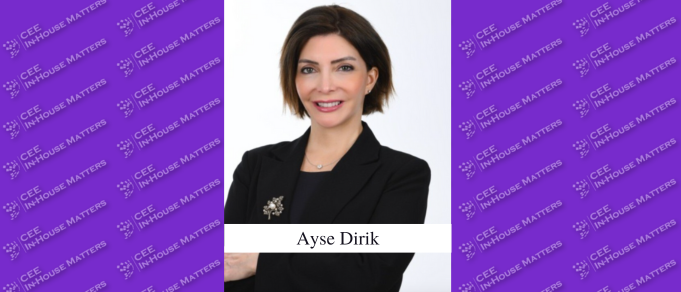Forgo, Damjanovic & Partners Managing Partner Zoltan Forgo talks about the evolution of the practice and their role as legal advisors in Hungary over the last 10 years.
CEELM: Over the last 10 years, what types of projects have been keeping your M&A team busy?
Forgo: In the past decade, our team has been primarily engaged in three types of deals. The first type, which I’d call “classic” deals, typically involved mature Hungarian companies being sold – usually to Western foreign strategic investors – in relatively plain structures (mostly 100% buyouts). These deals were more frequent in the earlier part of the decade but have seen a decline recently. Interestingly, we’re now seeing a role reversal with strategic international investors often on the sell side and Hungarian investors more and more on the buy side. Despite the shift, these classic deals remain prevalent in sectors such as pharmaceuticals, healthcare, technology, and energy, reflecting their sustained attractiveness for Western European buyers. The second type of deals was characterized by its complexity, involving multiple legal challenges and hurdles. A notable instance was the sale of Scitec Group to Polish Enterprise Investors, a transaction that took about 10 months to finalize due to its intricate nature. Another significant complex deal was the sale of Hungarian Post Insurance Companies by the German Talanx Group to the Hungarian state recently, which is indicative of a broader trend of foreign investors divesting to Hungarian entities. This aligns with the Hungarian government’s initiative to increase national ownership to 50% in strategic sectors like energy, telecommunications, and banking and insurance. The third type included cross-border transactions where Hungarian entities were part of a larger group being acquired. Such deals have been a constant over the years but have evolved recently. We’re observing a trend where Western companies are more frequently acquiring groups of businesses that include Hungarian subsidiaries rather than directly investing in standalone Hungarian companies.
CEELM: Looking back at the last 10 years, what have been your and your team’s most intense periods, and what do you believe led to them?
Forgo: The most challenging period was undoubtedly during the COVID-19 outbreak, particularly in the early months of 2020, when many transactions were put on hold or abandoned. However, in our practice, the past two years have marked a significant rebound, with an upsurge in M&A activities.
This surge can be attributed to several factors. Our firm’s reputation as an M&A specialist and our long-standing client relationships with some private equity and strategic investors have played a crucial role. We have also developed deep sector-specific expertise, particularly in pharmaceuticals, energy, TMT, and insurance, which attracted a diverse range of transactions.
CEELM: How have the client profiles evolved over the last decade?
Forgo: There’s been a significant shift in our client base over the last decade. Initially, most of our deals involved foreign strategic investors acquiring Hungarian companies where we have represented either selling Hungarian owners or Western foreign strategic buy-side investors. However, the tide has turned, with a noticeable increase in foreign investors on the sell side and Hungarian entities emerging as buyers. Furthermore, there’s a growing presence of investors from Central and Eastern Europe, including the Czech Republic, Slovakia, and Romania. These investors seem more adept at navigating the unique legal and economic challenges of Hungary, which can be attributed to their regional familiarity and understanding of local nuances.
CEELM: And what about their needs? What new expectations do you see from clients, and what do you feel has dropped in importance?
Forgo: Client expectations have evolved considerably. Today, clients seek highly specialized legal advice tailored to specific sectors. The era of general legal knowledge sufficing is over; clients now demand expertise in distinct niches. They also prioritize quick and efficient service, along with a favorable balance of cost and quality. Another critical expectation is the ability of firms to act as problem solvers who facilitate deal closures rather than complicating them. These skills are increasingly valued, placing pressure on firms to develop such capabilities.
CEELM: What have been the main recurring legislative challenges you have faced in making deals happen?
Forgo: Merger control filings, traditionally a significant hurdle, have seen some easing with raised thresholds and a simplified procedure. This change has led to quicker approvals in most cases. Conversely, FDI control has become more stringent, especially during the COVID-19 pandemic. This control process often extends transaction timelines significantly, sometimes by 2-3 months.
CEELM: What is on the horizon? What do you believe will be the highlights in a similar interview 10 years from now?
Forgo: Looking ahead, I anticipate the continuation and strengthening of trends like Hungarian buyers investing more in local assets. I also expect Central and Eastern European private equity and strategic investors to become increasingly active in the Hungarian market. However, this might result in lower valuations for Hungarian targets, a potential downside to this shift.
Forgo, Damjanovic & Partners is CEE Legal Matters' Practice Leader for Corporate/M&A in Hungary for 2024 – learn more here.
This article was originally published in Issue 10.11 of the CEE Legal Matters Magazine. If you would like to receive a hard copy of the magazine, you can subscribe here.














